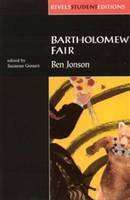Bartholomew Fair
- Unit price
- / per
-
Author:JONSON Ben
-
ISBN:9780719051500
-
Publication Date:November 2000
-
Edition:1
-
Pages:224
-
Binding:Paperback
-
Publisher:Manchester University Press
-
Country of Publication:


A Back Order button means that we don’t have the book in stock at our store. It may already be on order – or we can order it for you from a publisher or distributor at no additional cost.
As we source items from around the globe, a back-order can take anywhere from 5 days to several weeks to arrive, depending on the title.
To check how long this might take, you’re welcome to contact us and we can provide an ETA or any other information you need. We recommend checking the timeframe before committing to an online order.
Bartholomew Fair
- Unit price
- / per
-
Author:JONSON Ben
-
ISBN:9780719051500
-
Publication Date:November 2000
-
Edition:1
-
Pages:224
-
Binding:Paperback
-
Publisher:Manchester University Press
-
Country of Publication:
Description
This edition is the first to use the findings of feminist scholarship in examining the play's concern with forced marriage, pregnancy, sexual commerce and widowhood. Glosses and notes are intended for students and playgoers, clarifying the special languages and dialects Jonson employs to individualise the characters in his prose masterpiece.
Adding product to your cart
You may also like
A Back Order button means that we don’t have the book in stock at our store. It may already be on order – or we can order it for you from a publisher or distributor at no additional cost.
As we source items from around the globe, a back-order can take anywhere from 5 days to several weeks to arrive, depending on the title.
To check how long this might take, you’re welcome to contact us and we can provide an ETA or any other information you need. We recommend checking the timeframe before committing to an online order.
You may also like
You may also like
-
Bartholomew Fair is the climactic play of Ben Jonson's great comic period. Using the Fair as a symbolic representation of religious, social and political conflicts in Jacobean England, Jonson satirizes Puritans, fortune hunters, country bumpkins and inept representatives of the justice system, along with sharpsters and conmen who inhabit the Fair. Rich in unforgettable characters like Ursula the Pig Woman, the disguised JP Adam Overdo and Trouble-all the wandering madman, Bartholomew Fair combines a celebration of festivity with an attack on the excesses of natural life. The play was produced simultaneously at Court and at the Hope Theatre, site of bear-baiting, and through his Introduction and the puppet-show with which the play concludes, Jonson reflects on the drama, the theatre, actors and his rivals Marlowe and Shakespeare.
This edition is the first to use the findings of feminist scholarship in examining the play's concern with forced marriage, pregnancy, sexual commerce and widowhood. Glosses and notes are intended for students and playgoers, clarifying the special languages and dialects Jonson employs to individualise the characters in his prose masterpiece.
-
-
Author: JONSON BenISBN: 9780719051500Publication Date: November 2000Edition: 1Pages: 224Binding: PaperbackPublisher: Manchester University PressCountry of Publication:
Bartholomew Fair is the climactic play of Ben Jonson's great comic period. Using the Fair as a symbolic representation of religious, social and political conflicts in Jacobean England, Jonson satirizes Puritans, fortune hunters, country bumpkins and inept representatives of the justice system, along with sharpsters and conmen who inhabit the Fair. Rich in unforgettable characters like Ursula the Pig Woman, the disguised JP Adam Overdo and Trouble-all the wandering madman, Bartholomew Fair combines a celebration of festivity with an attack on the excesses of natural life. The play was produced simultaneously at Court and at the Hope Theatre, site of bear-baiting, and through his Introduction and the puppet-show with which the play concludes, Jonson reflects on the drama, the theatre, actors and his rivals Marlowe and Shakespeare.This edition is the first to use the findings of feminist scholarship in examining the play's concern with forced marriage, pregnancy, sexual commerce and widowhood. Glosses and notes are intended for students and playgoers, clarifying the special languages and dialects Jonson employs to individualise the characters in his prose masterpiece.
-
Author: JONSON BenISBN: 9780719051500Publication Date: November 2000Edition: 1Pages: 224Binding: PaperbackPublisher: Manchester University PressCountry of Publication:
-



